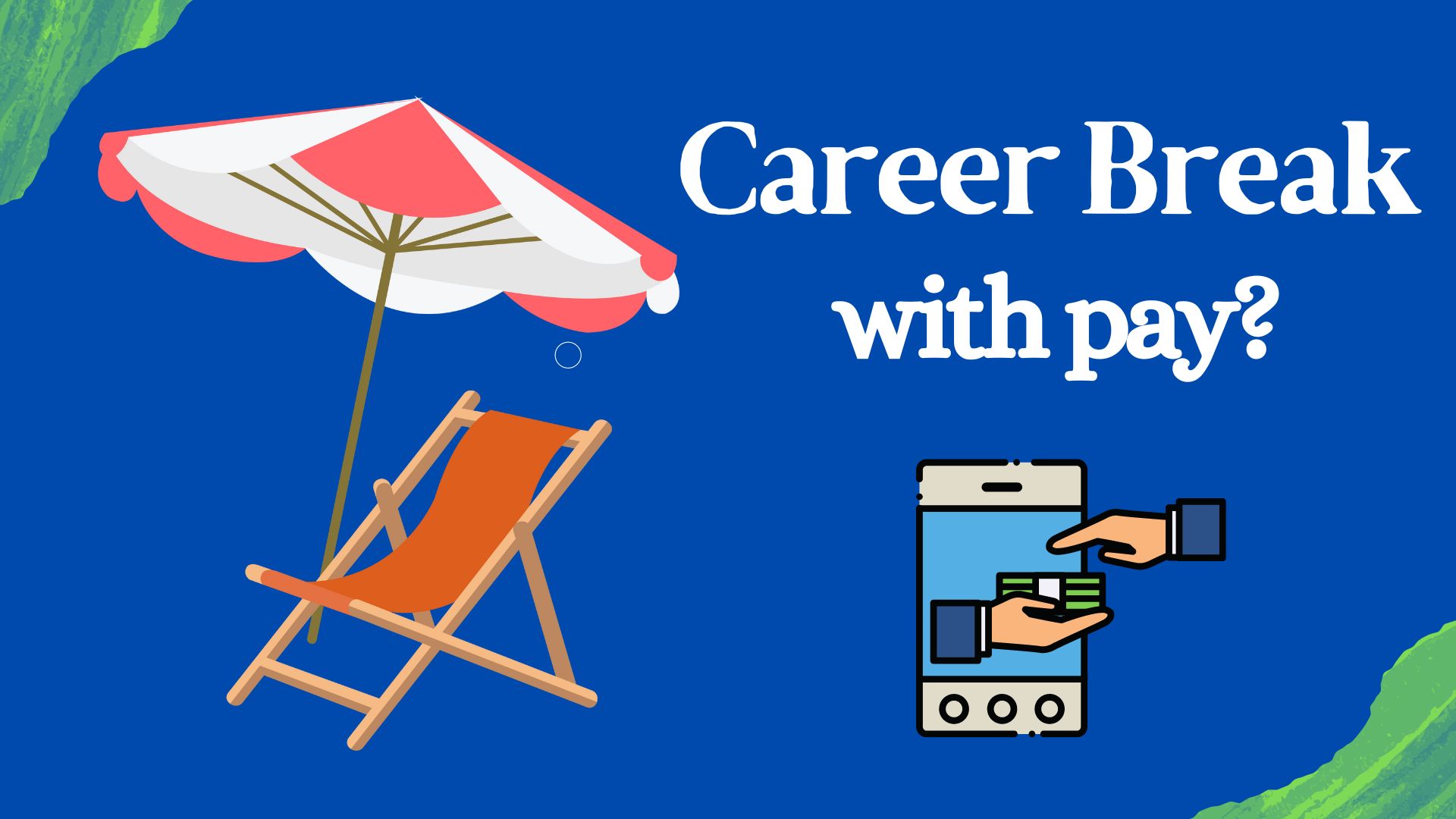If you are thinking to take a career break? Do not delay, Quit your job NOW! I have taken a career break only to regret why I haven’t done it before? I know you are hell afraid of only one thing and that is no monthly paycheck. Who will pay your monthly EMI’s and daily expenses? I have figured it out, so if I say that you can quit your job and live a stress-free yet debt-free life then hear me out and keep reading to know-how in detail.
Career breaks are still looked upon as bad remarks on your resume. According to a Manpower survey, 84% of millennials anticipate taking a break at some point in their career. A career break or career gap should be treated as normal as taking maternity or paternity leaves. There is nothing wrong with taking a career break, as humans we should haul, take a step back and breathe in the open air. There is no harm in having wings for some time, as it’s only humane to do so.
Table of Contents
What is a career break?
A career break means that you quit your job and remain unemployed for some time. It is also referred to as a career gap or break from a job. There are various reasons for the career gap and it may be a voluntary or involuntary break. Though 60% of the career break are taken by people out of their willingness rest are due to job losses, lack of employable skillsets, disability, or conviction history. A career break is not considered good to be on your resume, rather some recruiters even use it as a means to bargain or negotiate for a lesser salary.
Reasons for a career break
Employees are burned out, after all, they are humans, not machines. Though rejuvenating vacations and family time helps in getting charged up at times if the job starts making you feel sick internally, then it is time to say goodbye to your job. You work to pay your bills and save more for your future. What if instead of saving you end up paying more for your health treatments? It is just not about your physical health as mental health is the one that takes a toll.
When we asked people about their career break below were some of the reasons that they gave:
- Personal issues
- Eldercare
- Sabbatical
- Raising small children
- Pursue further education
- Personal health or family health issues
- Job transfer of spouse to a new country
Do you think that these would be the only reasons to quit their jobs, no, as you guessed there are other real reasons which are either not told for obvious reasons let us know what they are?
- Spend quality time with children or family or spouse
- Invest time to study more and upgrade your skills
- Heal yourself, heal your mind and health
- Follow your passion be it singing, blogging or you tubbing
- Become an entrepreneur to try your luck in business
The real reasons are more than you can think of. After all who does not want to enjoy life without being glued to screens for 9 to 10 hours 5 days a week or even more.

How to quit a job while receiving monthly paychecks?
It is possible to quit your job or take a career break without forgetting your monthly paychecks. Let us tell you how:
The first step in this process is to start saving more money. Saving 30% of your income will help you take a permanent career break. Savings are the key to your financial freedom. Take savings seriously and make it work.
- Create multiple sources of income
Staying with only one source of income is like a crime in today’s times. Create passive sources of income. Create as many sources of income as possible either through your investments, following your passion, selling your skills, or starting a start-up business.
- Invest your savings
Only savings are of no use. You need to invest your savings at the right time, at the right channel of investments. Create your investment portfolio to maximize your returns and mitigate risks.
If you follow the above steps religiously your savings will become your monthly paychecks. Start now to create a life free of a job, stress, and debt but with financial freedom and stability.

How to get a job after a career break?
- Bridge the skills gap
You may have been extremely competent at your job before you went on a break, but chances are that with time a lot has changed in the way your job is done now. So take stock of your current skill set. Take note of what you have retained, what needs to be polished, what needs to be unlearned, and what needs to be picked up afresh. Now that you know what skills you need to get back on your feet, find ways to update them. Enroll for a short course if needed to add some in-demand skills to your resume. You could try out online courses, too, but make sure you do one that gives you an authentic certification. If you are going to head for a new industry altogether, this is the time to research and study it thoroughly. Decide on what course to take keeping in mind the size of the career shift you are marking or the amount of skill refreshment you need.
There is a pool of job opportunities you just have to fish for the relevant ones for yourself. Search for the jobs which suit your skill sets. Make sure that you apply through third-party platforms but, if possible, email your resume and cover letter with a short and sweet bio of yours to the recruiter. Job hunting is tiring but worth it if you land up with a high paid good job. Make sure you prepare your resume which makes you stand out from the crowd. No one will bother to call you back unless you make sufficient efforts to attract them to you.
- Career break no problem
Do not be traumatized because of the career gap in your resume and try to mask it with wrong or false information. You don’t need to put it out there in bold letters and give it undue attention also. One way to deal with this gap is by doing away with the conventional chronological resume.
You may also choose to include any sort of freelance work, consulting gigs, internships, or volunteer programs you did during your “break.” These activities are 100% viable, so make sure to list them under your professional experience. Include the date of activity, location, brands worked on, responsibilities held, and accomplishments, just as you would a full-time gig.
- Networking
Whichever stage of your career you are in, there is no substitute for networking. People, and the relationships you forge with them, are the key to your professional life. Don’t be shy, put yourself out there — people want to help! Attend industry events, join an association, schedule meetings or informational interviews, treat people to coffee or lunch, find a mentor or reconnect with previous employers and connections in your industry. Those who take a break from work, remember not to cut off all your professional contacts. Keep in touch with them and when you are ready to start looking for a job, let it be known that you are actively looking.
- Get visible to the virtual world
Spruce up your social media accounts, update information on your LinkedIn account and create a searchable online presence. Social media is inevitable in this time and age, with a 2015 Jobvite survey revealing that about 92 % of recruiters use it in their hiring process. You can use social media to reach out to your old connections and let them know that you are looking for opportunities. You can also keep yourself updated with the industry news and trends.
- Be flexible
You simply never know where life is going to take you. As a recruiter, it was not uncommon to see a two-day freelance job turn into a full-time position. So keeping an open mind and thinking “yes” instead of “I’m not sure about that” might lead you to places you might have never imagined.
- Consider Interview as a conversation
It is important to remember that a job interview or networking event is simply a conversation. Therefore, be present and positive at all times. Listen, don’t interrupt, and most importantly, be yourself. It is critical to sell yourself and your skills, but make sure you are truly paying attention at the same time.
- Say yes only if you are 100% sure
Do some soul searching on what you are looking for at this point in your life — it could be the specific work, or the environment you seek to work in. Once you have a good idea as to what you want, do your best to communicate that to potential employers and recruiters so they can help you find it. Honesty is the best policy. Don’t hide or talk around the break in your career — be honest and prepared to share reasons as to why you stepped away from your work and how that particular time helped improve you as a person. It is likely that you have gained solid experience in non-traditional ways such as volunteering, running a household and family, traveling, etc. Be sure to mention these attributes you have gained to reinforce your worth.
The above steps will help you return to work after a career break. There is no shortcut to the process but getting a job back won’t be difficult if you follow the above steps.
Funfact:
65% of women take a career break to raise their kids or due to health issues after pregnancy.
What is your career break story?

